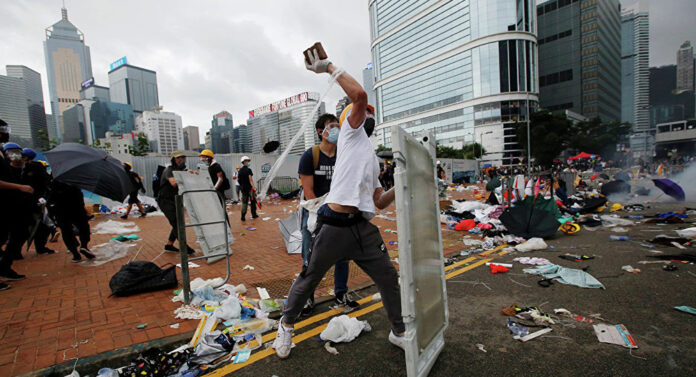
On the 24th Sept. 2021, the Chinese Ministry of Foreign Affairs released the “Fact Sheet: U.S. Interference in Hong Kong Affairs and Support for Anti-China, Destabilizing Forces.”
Enacting Hong Kong-related Acts, vilifying China’s policy on Hong Kong
On 27 November 2019, then U.S. President Donald Trump signed the Hong Kong Human Rights and Democracy Act of 2019 and the Act to prohibit the commercial export of covered munitions items to the Hong Kong Police Force, which accuse China’s central government of undermining the high degree of autonomy of Hong Kong, authorize the U.S. President to impose sanctions such as inadmissibility to the United States and asset blocking against relevant Chinese officials, require the U.S. Secretary of State to submit a report regarding Hong Kong affairs on a yearly basis, and prohibit U.S. exports of police equipment, such as tear gas, pepper spray, rubber bullets and stun guns, to Hong Kong.
On 14 July 2020, then U.S. President Trump signed the Hong Kong Autonomy Act, which requires the imposition of sanctions with respect to the foreign individuals or entities involved in the so-called erosion of certain obligations of China with respect to Hong Kong and foreign financial institutions that conduct significant transactions with those individuals or entities. On the same day, Trump signed the President’s Executive Order 13936 on Hong Kong Normalization, which determined that the situation with respect to Hong Kong constitutes a threat to the national security, foreign policy and economy of the United States.

On 18 February 2021, Gregory Meeks, Chairman of the Committee on Foreign Affairs of the U.S. House of Representatives introduced a resolution condemning the so-called “continued violation of rights and freedoms of the people of Hong Kong by the People’s Republic of China (PRC) and the Government of the Hong Kong Special Administrative Region.” The resolution was adopted by the House on 19 April.
The U.S. Congress is considering several other ill-intentioned bills regarding Hong Kong:
On 25 January and 8 February 2021, Republican Representative John Curtis and Republican Senator Marco Rubio introduced the Hong Kong Safe Harbor Act in the House and the Senate respectively, requiring the U.S. government to designate refugee status to individuals espousing “Hong Kong independence” and participating in the riots in Hong Kong.
On 18 March 2021, Senator Rubio introduced a resolution condemning the so-called “crackdown by the Government of the People’s Republic of China and the Chinese Communist Party in Hong Kong, including the arrests of pro-democracy activists and repeated violations of the obligations of that Government undertaken in the Sino-British Declaration of 1984 and the Hong Kong Basic Law”.
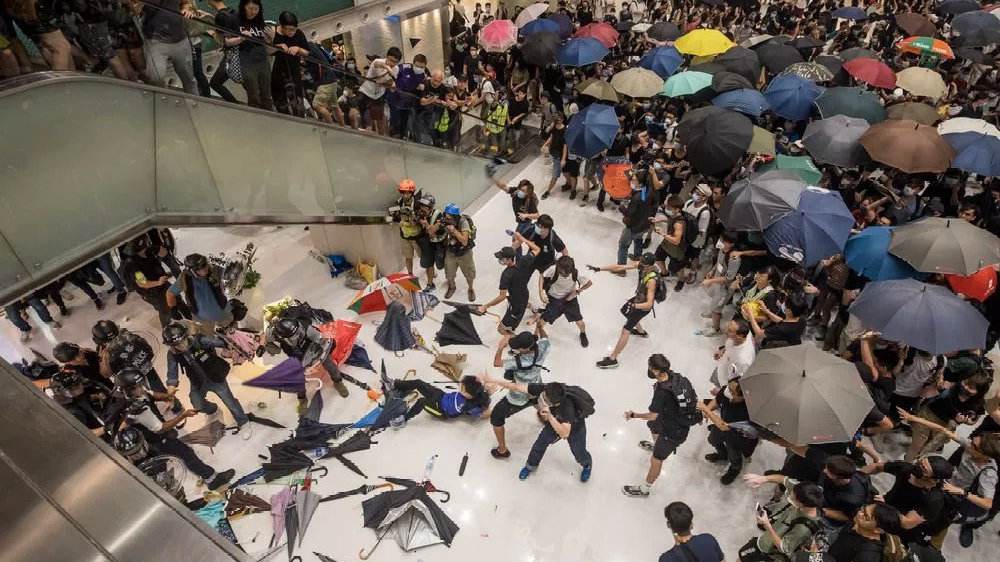
On 24 June 2021, Republican Senator Ben Sasse introduced the Democracy in Hong Kong Congressional Gold Medal Act on conferring the Congressional Gold Medal to all the executives and staff of Apple Daily, a newspaper in Hong Kong.
On 30 June 2021, Republican Representative Tom Malinowski introduced the Hong Kong People’s Freedom and Choice Act of 2021, calling for providing protected status to those who oppose China and provoke instability as well as law breakers and offenders in Hong Kong and for enhancing protocols to facilitate their travels to the United States.
On 30 June 2021, Republican Representative Scott Perry introduced the Hong Kong Freedom Act, calling for recognition of the HKSAR as “a separate, independent country”.
Obstruct the implementation of the Hong Kong National Security Law
On 29 May 2020, then U.S. President Trump announced revocation of the special status and preferential economic treatment for Hong Kong.
On 29 June 2020, then U.S. Secretary of State Mike Pompeo announced the immediate end of exports of U.S. defense equipment to Hong Kong and restrictions on exports of U.S. defense and dual-use technologies to Hong Kong.
On 29 June 2020, then U.S. Secretary of Commerce Wilbur Ross issued a statement, officially revoking Hong Kong’s special status in trade.
On 30 June 2020, the U.S. Department of Commerce announced the suspension of license exceptions for exports to Hong Kong, banning exports of U.S.-origin defense equipment and sensitive technologies to Hong Kong.
On 7 August 2020, the U.S. government imposed sanctions on 11 officials of China’s central government and the HKSAR government on the ground of enforcing the Hong Kong National Security Law and undermining Hong Kong’s high degree of autonomy.
On 11 August 2020, the U.S. Department of Homeland Security announced that after 25 September 2020, imported goods produced in Hong Kong must be marked to indicate “China” instead of “Hong Kong”.
On 19 August 2020, the U.S. Department of State announced the suspension or termination of three bilateral agreements with Hong Kong covering the surrender of fugitive offenders, the transfer of sentenced persons, and reciprocal tax exemptions on income derived from the international operation of ships.
On 14 October 2020, the U.S. Department of State submitted its first report to Congress pursuant to the Hong Kong Autonomy Act, listing 10 officials of China’s central government and the HKSAR government as “persons undermining the autonomy of Hong Kong” and threatening to impose sanctions on financial institutions related to these individuals.
On 9 November 2020, the U.S. Department of State announced sanctions on four officials of China’s central government and the HKSAR government for “threatening the peace, security and autonomy of Hong Kong.”
On 7 December 2020, the U.S. Department of State imposed sanctions on 14 Vice Chairpersons of the Standing Committee of the NPC of China on the ground of the NPC Standing Committee formulating the Hong Kong National Security Law and disqualifying four opposition members of Hong Kong’s Legislative Council.
On 15 January 2021, then U.S. Secretary of State Pompeo issued a statement, announcing sanctions on six officials of China’s central government and the HKSAR government for arresting 55 so-called “pro-democracy politicians and activists” by Hong Kong police.
On 16 March 2021, the U.S. Department of State updated its Hong Kong Autonomy Act report, announcing an updated list of sanctioned individuals and additional financial sanctions following the NPC’s decision to improve the electoral system of Hong Kong and implement the Hong Kong National Security Law.
On 7 July 2021, the White House issued a Notice on the Continuation of the National Emergency with Respect to Hong Kong, announcing the continuation of the so-called national emergency declared with respect to the Hong Kong situation, and extended U.S. sanctions on Hong Kong for one year.
On 16 July 2021, the U.S. Department of State, Department of Commerce, Department of Homeland Security and Department of Treasury jointly issued “Hong Kong Business Advisory” on the ground of enforcing the Hong Kong National Security Law and closing of Apple Daily, in an attempt to cast doubt over Hong Kong’s business environment as well as the development of Hong Kong.
Undermine Hong Kong’s prosperity and stability
On 25 February 2019, then U.S. Consul General to Hong Kong Kurt Tong expressed that an amendment to the Fugitive Offenders Ordinance could have a negative impact on the implementation of the bilateral arrangements between the United States and Hong Kong.
On 21 March 2019, the U.S. Department of State released the 2019 Hong Kong Policy Act Report alleging that China’s central government had “adversely impacted Hong Kong in multiple areas”.
On 7 May 2019, the U.S.-China Economic and Security Review Commission of U.S. Congress issued a report, alleging that the HKSAR government’s proposed extradition bill would create serious risks for U.S. national security and economic interests in Hong Kong.
On 16 May 2019, the U.S. State Department issued a statement, alleging that the HKSAR government’s proposed amendments to the Fugitive Ordinance would threaten Hong Kong’s rule of law.
On 19 June 2019, U.S. House Speaker Nancy Pelosi addressed a breakfast meeting hosted by The Christian Science Monitor in which she claimed that “the demonstration by some two million people against the extradition bill” was “a beautiful sight to behold”.
On 26 July 2019, then Chairman of the U.S. House Foreign Affairs Committee Eliot Engel issued an unfounded statement about the so-called “police brutality in response to protests in Hong Kong.”
On 17 September 2019, the U.S. Congressional-Executive Commission on China held a hearing in Hong Kong to whitewash the violent demonstrations against the extradition bill as undermining One Country, Two Systems and Hong Kong’s autonomy.
On 28 September 2019, the U.S. The Congressional-Executive Commission on China made a statement on the fifth anniversary of the so-called “Umbrella Movement protests”, in an attempt to vilify One Country, Two Systems and the central government’s policy on Hong Kong.
On 7 October 2019, then U.S. President Donald Trump said that “we just want to see a humane solution” in Hong Kong, and “they are flying the American flag.”
On 24 October 2019, then U.S. Vice President Mike Pence delivered an anti-China speech at the Wilson Center, in which he alleged that “Hong Kong is a living example of what can happen when China embraces liberty”.
On 21 November 2019, after the passing of the Hong Kong Human Rights and Democracy Act, U.S. House Speaker Nancy Pelosi alleged that China has broken the promise of a high degree of autonomy.
On 10 December 2019, U.S. Consul General in Hong Kong Hanscom Smith wrote an article for Ming Pao, a Hong Kong newspaper, asserting that the adoption of the Hong Kong Human Rights and Democracy Act by the United States reflected its commitment to universal values.
On 22 May 2020, then U.S. Secretary of State Mike Pompeo made unfounded accusations that the National Security Law was “imposed” on Hong Kong to “undermine Hong Kong’s high degree of autonomy.”
On 27 May 2020, then U.S. Secretary of State Mike Pompeo would certify to Congress that Hong Kong does not continue to warrant treatment under U.S. law in the same manner as U.S. laws were applied to Hong Kong before July 1997.
On 28 May 2020, the U.S. State Department submitted to Congress the 2020 Hong Kong Policy Act Report and certified that Hong Kong did not continue to warrant differential treatment under U.S. law.
On 30 June 2020, then U.S. Secretary of State Mike Pompeo made a statement, asserting that the Hong Kong National Security Law undermines One Country, Two Systems, and violates commitments made in the Sino-British Joint Declaration and the Basic Law of the HKSAR.
On 1 July 2020, House Speaker Nancy Pelosi alleged that the Hong Kong National Security Law was “intended to destroy the freedoms they were promised” and it “signals the death of the One Country, Two Systems principle”.
On 6 July 2020, U.S. Consul General in Hong Kong Hanscom Smith asserted that the Hong Kong National Security Law creates an atmosphere of self-censorship is a tragedy for Hong Kong.
On 14 July 2020, then U.S. Secretary of State Mike Pompeo issued a statement in support of the so-called “primary election” organized by the opposition in Hong Kong.
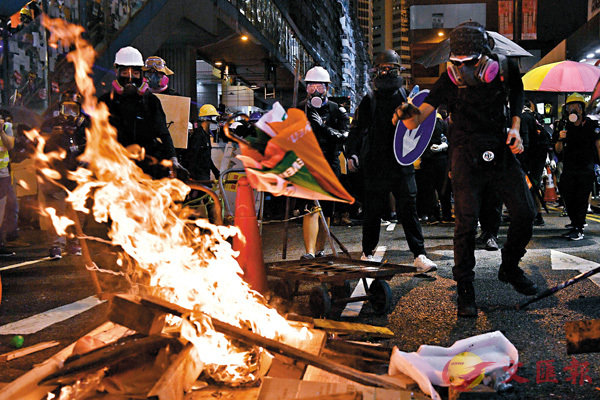
On 23 July 2020, then U.S. Secretary of State Mike Pompeo delivered an anti-China speech, accusing the CPC of “tightening its grip on Hong Kong” and called Nathan Law Kwun-chung and other individuals who are opposed to China and attempt to destabilize Hong Kong as fighters for democracy.
On 31 July 2020, then White House Press Secretary Kayleigh McEnany stated the United States’ opposition to the HKSAR government’s decision to disqualify opposition candidates.
On 7 August 2020, the U.S. Consulate General in Hong Kong issued a statement attacking the Hong Kong National Security Law.
On 11 September 2020, then U.S. Secretary of State Mike Pompeo attacked China in a statement on a case of illegal border crossing made by 12 Hong Kong residents in an attempt to meddle in China’s judicial sovereignty.
On 11 November 2020, then Assistant to the President for National Security Affairs Robert O’Brien asserted that China’s actions disqualifying the opposition legislators from Hong Kong’s Legislative Council violated the Sino-British Joint Declaration and that the United States will identify and sanction those responsible for extinguishing Hong Kong’s freedom.
On 12 November 2020, then U.S. Secretary of State Mike Pompeo accused the lawful decision of the NPC of being an “onslaught against Hong Kong’s freedoms” and clamored for “holding accountable the people responsible for eroding Hong Kong’s autonomy and freedoms”.
On 6 January 2021, then U.S. Secretary of State Mike Pompeo issued a statement on the Hong Kong police’s lawful arrest of 53 opposition members who were suspected of violating the Hong Kong National Security law. He called for the “immediate and unconditional release” of those people and threatened further sanctions.
On 14 January 2021, the U.S. Congressional-Executive Commission on China called for providing shelters for offenders from Hong Kong based on U.S. domestic laws.
On 11 March 2021, the Spokesperson of the U.S. State Department made unwarranted charges against the passage of the NPC’s Decision on Improving the Electoral System of the Hong Kong Special Administrative Region, asserting that the decision was a continuing assault on democratic institutions and a direct attack on Hong Kong’s democratic processes.
On 11 March 2021, U.S. Secretary of State Antony Blinken released a statement on the passage of the NPC’s Decision on Improving the Electoral System of the Hong Kong Special Administrative Region in which he asserted that it was a direct attack on the autonomy, freedoms and democratic processes of Hong Kong.
On 30 March 2021, the U.S. State Department released a 2020 Country Report on Human Rights Practices, vilifying the Hong Kong National Security Law and attacking law-based administration by the HKSAR government and law enforcement carried out by Hong Kong police.
On 31 March 2021, the U.S. Department of State issued the 2021 Hong Kong Policy Act Report, stating that Hong Kong would no longer receive the differential treatment previously accorded to it under U.S. laws.
On 1 April 2021, U.S. Consul General to Hong Kong Hanscom Smith, in media interviews and articles published on newspapers such as the South China Morning Post and Ming Pao, alleged that changes to the electoral system would render Hong Kong’s election results meaningless, and threatened to impose U.S. sanctions.
On 16 April 2021, Nancy Pelosi, Speaker of the U.S. House of Representatives, tweeted that the arrest of Martin Lee and others who are opposed to China and attempt to destabilize Hong Kong was “another sign of Beijing’s assault on the rule of law” and felt “saddened and disturbed”.
On 17 April 2021, U.S. Secretary of State Antony Blinken tweeted that sentencing for politically-motivated charges “are unacceptable” and called for the “release” of those who are opposed to China and attempt to destabilize Hong Kong.
On 7 May 2021, U.S. Secretary of State Antony Blinken tweeted that “the United States stands with the people of Hong Kong”. He called for rejecting the sentencing of those who are opposed to China and attempt to destabilize Hong Kong and their immediate release.
On 27 May 2021, U.S. Secretary of State Antony Blinken issued a press statement on the State Department website, unwarrantedly accusing the Chinese government of undermining the democratic institutions of Hong Kong and calling for all individuals arrested under the Hong Kong National Security Law to be released and their charges dropped.
On 3 June 2021, U.S. Secretary of State Antony Blinken called those who are opposed to China and attempt to destabilize Hong Kong “brave activists”.
On 4 June 2021, the U.S. Consulate General in Hong Kong lit up electric candles inside its office window in support of the so-called candlelight vigil staged by those who are opposed to China and attempt to destabilize Hong Kong.
On 5 June 2021, U.S. Secretary of State Antony Blinken tweeted that those who are opposed to China and attempt to destabilize Hong Kong were inspiring and called for the immediate release of those arrested.
On 11 June 2021, in an interview with Reuters, U.S. Consul General to Hong Kong Hanscom Smith alleged that the enactment of the Hong Kong National Security Law had created an “atmosphere of coercion” threatening both Hong Kong’s freedoms and its standing as an international business hub.
On 21 June 2021, the spokesperson of the U.S. Department of State, accused the HKSAR government of using the Hong Kong National Security Law to suppress independent media and stifle freedom of expression.
On 24 June 2021, in a statement released on the White House website, U.S. President Joe Biden, using media freedom as a pretext, called Apple Daily’s closure “a sad day for media freedom” and a signal of “intensified repression by Beijing”.
On 29 June 2021, the U.S. Congressional-Executive Commission on China held a roundtable on the one-year anniversary of the enactment of the Hong Kong National Security Law, making unwarranted charges against human rights and the rule of law in Hong Kong.
On 30 June 2021, at the one-year anniversary of the enactment of the Hong Kong National Security Law, the U.S. Consulate General in Hong Kong, in disregard of facts, openly attacked the legislation, alleging that it curtails Hong Kong’s freedom of expression.
On 1 July 2021, the U.S. Department of State issued the so-called “2021 Trafficking in Persons Report”. In the part on China, the report denigrated Hong Kong’s successful efforts to combat human trafficking, and demonized the Hong Kong National Security Law.
On 13 July 2021, the spokesperson of the U.S. Department of State unwarrantedly accused China of continuing to undermine Hong Kong’s autonomy and business environment, and called for international attention.
On 21 July 2021, the U.S. Department of State issued the so-called Investment Climate Statements. In the part on Hong Kong, the Statements played up the so-called security risks of the Hong Kong National Security Law and defamed Hong Kong’s business environment.
On 2 August 2021, the U.S. Consulate General in Hong Kong posted “Bearing Witness” on its website, listing individuals who have been held accountable in accordance with law for opposing China and attempting to destabilize Hong Kong.
Shielding and supporting anti-China lawbreakers
On 17 March 2019, the U.S. Consulate General in Hong Kong arranged for a delegation of the U.S.-China Working Group of the U.S. House of Representatives to meet with Anson Chan Fang On-sang, Martin Lee Chu-ming and Joshua Wong Chi-fung and others, to discuss the HKSAR government’s disqualification of opposition candidates from the Legislative Council election, the proposed amendments to the Fugitive Offenders Ordinance, and Hong Kong’s political development.
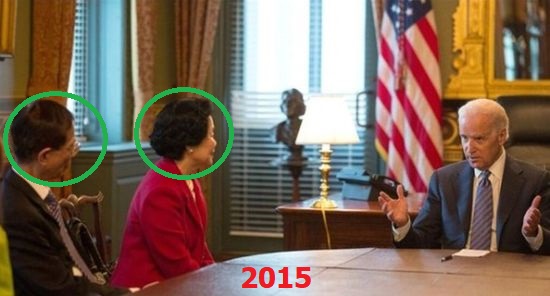
From 19 to 26 March 2019, Anson Chan Fang On-sang, Dennis Kwok Wing-hang, Charles Mok Nai-kwong and several others visited the United States, where they met with U.S. officials including then Vice President Mike Pence, Speaker of the House of Representatives Nancy Pelosi, then principal policy adviser to the U.S. Secretary of State Miles Yu, and then Assistant Secretary for Indo-Pacific Security Affairs of the U.S. Department of Defense Randall Schriver. The U.S. side provided a platform and support for Anson Chan and others to preach “Hong Kong independence” and spread political disinformation.
From 13 to 17 May 2019, six people, namely Martin Lee Chu-ming, Lee Cheuk-yan, Mak Yin-ting, Margaret Ng Ngoi-yee, James To Kun-sun and Nathan Law Kwun-chung, visited the United States and met with U.S. House Speaker Nancy Pelosi, then Secretary of State Mike Pompeo, then White House National Security Council Senior Director for Asian Affairs Matt Pottinger and others. The U.S. Congressional-Executive Commission on China asked the HKSAR government to withdraw the draft amendments to the Fugitive Offenders Ordinance.
On 14 May 2019, the U.S. National Endowment for Democracy held a seminar on the proposed amendment to the Fugitive Offenders Ordinance by the HKSAR government. Participants of the seminar called for taking immediate action to stop what they described as the “evil law”.
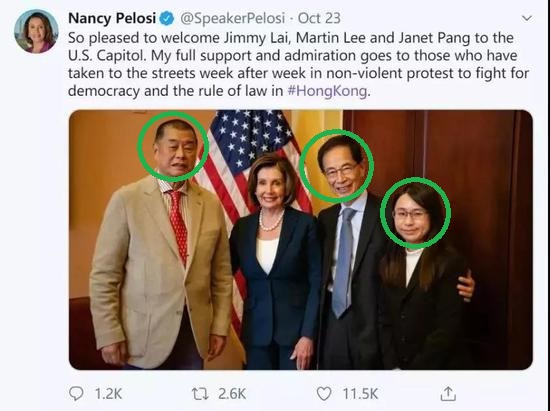
From 7 to 11 July 2019, Jimmy Lai Chee-ying, who is opposed to China and attempts to destabilize Hong Kong, visited the United States and met with then Vice President Mike Pence, then Secretary of State Mike Pompeo, then National Security Advisor John Bolton, then Assistant Secretary of State David Stilwell and others. Jimmy Lai lobbied for U.S. intervention in Hong Kong affairs, and discussed with the U.S. side developments in Hong Kong surrounding the amendment bill and the so-called “autonomous status of Hong Kong”, for which he received positive response from the U.S. side.
On 6 August 2019, Joshua Wong Chi-fung, Nathan Law Kwun-chung and other leading figures of Demosistõ, an organization for “Hong Kong independence”, met with officials of the U.S. Consulate General in Hong Kong and called on the U.S. side to adopt a Hong Kong human rights and democracy act as soon as possible and impose sanctions on Hong Kong.
On 17 September 2019, the U.S. Congressional-Executive Commission on China arranged for Joshua Wong Chi-fung, Dennis Ho Wan-see, Nathan Law Kwun-chung, Sunny Cheung Kwan-yang and others to attend a hearing, spreading political disinformation and smearing the central government of China and the HKSAR government.
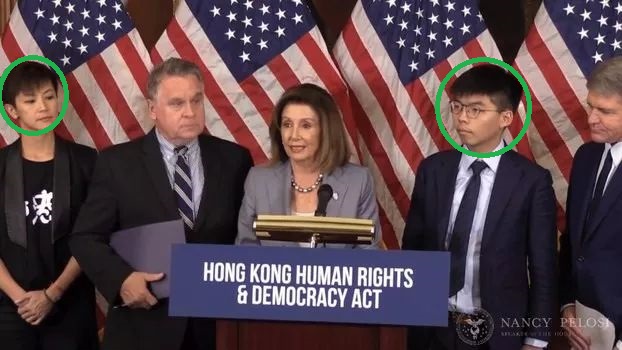
On 17 September 2019, U.S. Senator Todd Yang attended a press conference held on Capitol Hill to inaugurate the so-called Hong Kong Democracy Council, an organization supporting “Hong Kong independence”.
From 12 to 13 October 2019, U.S. Senator Ted Cruz visited Hong Kong and met with Jimmy Lai Chee-ying, Anson Chan Fang On-sang, Dennis Kwok Wing-hang, Charles Mok Nai-kwong, Bonnie Leung Wing-man and other leading figures among those who are opposed to China and attempt to destabilize Hong Kong. Cruz told the media that he did not see any violence, but accused the Hong Kong police, who had been enforcing the law with great restraint, of violent suppression.
From 22 to 26 October 2019, Jimmy Lai Chee-ying, Martin Lee Chu-ming and others who are opposed to China and attempt to destabilize Hong Kong visited the United States and met with Speaker of the House of Representatives Nancy Pelosi, then Assistant Secretary of State David Stilwell, Chair of the Congressional-Executive Commission on China Jim McGovern and several members of Congress.
On 4 February 2020, at the invitation of U.S. senator Rick Scott, Nathan Law Kwun-chung, who is opposed to China and attempts to destabilize Hong Kong, attended the U.S. President’s State of the Union address.
On 5 March 2020, then U.S. Deputy Assistant Secretary of State for East Asian and Pacific Affairs Jonathan Fritz and U.S. Consul General to Hong Kong Hanscom Smith met with Charles Mok Nai-kwong and some others who are opposed to China and attempt to destabilize Hong Kong.
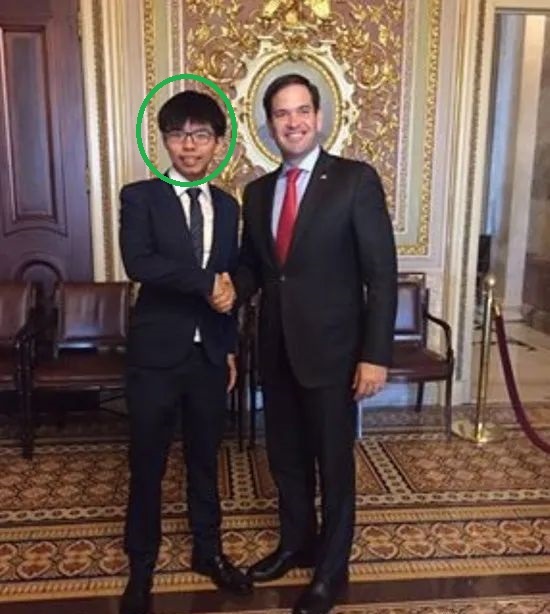
On 21 March 2020, U.S. Consul General to Hong Kong Hanscom Smith met with Joshua Wong Chi-fung, Sunny Cheung Kwan-yang and Fergus Leung Fong-wai, among others, and accepted a so-called petition from Wong. Wong urged the United States to impose sanctions on HKSAR government officials and members of the Hong Kong police by invoking the U.S. Hong Kong Human Rights and Democracy Act.
On 18 April 2020, then U.S. Secretary of State Mike Pompeo issued a statement making groundless accusations against Hong Kong police’s arrest of individuals who are opposed to China and attempt to destabilize Hong Kong.
On 27 May 2020, U.S. Senator Joshua Hawley met with Joshua Wong Chi-fung and others who are opposed to China and attempt to destabilize Hong Kong.
On 1 July 2020, the U.S. Senate Committee on Foreign Relations held a hearing and arranged for Nathan Law Kwun-chung, Lee Cheuk-yan and others who are opposed to China and attempt to destabilize Hong Kong to attend the hearing via video link, providing a platform for them to vilify the Hong Kong National Security Law and the central government’s policy on Hong Kong.
On 21 July 2020, then U.S. Secretary of State Mike Pompeo had a one-on-one meeting in London with Nathan Law Kwun-chung, a “Hong Kong independence” advocate who had fled to the UK, in a move to embolden Law. Law smeared China’s central government and the HKSAR government, and called on the United States to exert more pressure on China.
On 10 August 2020, then National Security Advisor Robert O’Brien issued a statement claiming that the U.S. side is “deeply troubled by the arrest of pro-democracy advocates” including Jimmy Lai Chee-ying and calling on Beijing to repeal the Hong Kong National Security Law.
On 16 December 2020, the U.S. Senate Committee on the Judiciary arranged for Nathan Law Kwun-chung, a “Hong Kong independence” advocate, to attend a hearing via video link. Law claimed that the Hong Kong National Security Law restricted Hong Kong people’s freedom of expression and right to protest, and urged the United States to grant asylum to more Hong Kong people.
On 6 January 2021, then U.S. Secretary of State Mike Pompeo issued a statement expressing so-called concern over the arrest of more than 50 individuals who are opposed to China and attempt to destabilize Hong Kong.
On 15 January 2021, then U.S. Secretary of State Mike Pompeo called on China to immediately release individuals sanctioned under the Hong Kong National Security Law and drop charges against them.
On 31 January 2021, nine U.S. senators and house representatives including Jim McGovern, Marco Rubio and Jeff Merkley wrote a joint letter to the Nobel Peace Prize Committee nominating the so-called “pro-democracy movement in Hong Kong” for the 2021 Nobel Peace Prize.
On 28 February 2021, U.S. Secretary of State Antony Blinken posted a tweet to “condemn the detention of and charges filed against pan-democratic candidates in Hong Kong’s elections” by the HKSAR government.
On 16 April 2021, U.S. Secretary of State Antony Blinken issued a statement making unwarranted accusations against China over the sentencing of Martin Lee Chu-ming, Jimmy Lai Chee-ying and other individuals who are opposed to China and attempt to destabilize Hong Kong.
On 8 July 2021, Joshua Huck, Chief of the Economic and Political Section of the U.S. Consulate General in Hong Kong, attended as an observer an HK court trial of individuals suspected of illegally planning, organizing and carrying out the “35 +” and “10 steps to mutual destruction” plan.
Colluding with allies to interfere in Hong Kong affairs
On 27 May 2020, the United States Mission to the United Nations issued a statement calling for a UN Security Council meeting on Hong Kong. The statement claimed that Hong Kong is “a matter of urgent global concern that implicates international peace and security”.
On 28 May 2020, foreign ministers of the United States, the United Kingdom, Australia and Canada issued a joint statement on Hong Kong, attacking the Hong Kong National Security Law to be adopted by China’s NPC.
On 17 June 2020, foreign ministers of the United States and other G7 countries and the High Representative of the European Union issued a joint statement on Hong Kong, claiming that the Hong Kong National Security Law would undermine One country, Two Systems and Hong Kong’s high degree of autonomy.
On 9 August 2020, foreign ministers of the United States and other Five Eyes countries issued a joint statement on Hong Kong, slandering the central government’s policy on Hong Kong and urging China’s NPC to revoke the disqualification of the four opposition members of the Legislative Council.
On 18 November 2020, foreign ministers of the United States and other Five Eyes countries issued a joint statement on Hong Kong, attacking the decision of the Standing Committee of the NPC on the qualification of members of the Hong Kong Legislative Council and China’s policy on Hong Kong.
On 9 January 2021, foreign ministers of the United States, the United Kingdom, Australia, and Canada issued a joint statement on Hong Kong, expressing so-called serious concern on the arrest of 55 individuals who are opposed to China and attempt to destabilize Hong Kong by Hong Kong police in accordance with law.
On 12 March 2021, foreign ministers of the United States and other G7 countries and the EU High Representative for Foreign Affairs and Security Policy issued a joint statement on Hong Kong, claiming that the changes made by the Chinese government to Hong Kong’s electoral system were aimed at eliminating dissent in Hong Kong.
On 5 May 2021, the G7 foreign ministers’ meeting attended by the United States and other relevant countries set up an international group called “friends of Hong Kong”, to get other Western countries on board to interfere in Hong Kong affairs.
On 13 June 2021, the G7 Summit called on China to respect human rights and fundamental freedoms, and the high degree of autonomy for Hong Kong enshrined in the Sino-British Joint Declaration and the Basic Law.
From 21 June to 14 July 2021, during the 47th session of the UN Human Rights Council, the United States and 43 other countries signed a joint statement against China initiated by Canada, expressing “concern” over “human rights abuses” in Hong Kong. On 1 July, the United States led a side event on the one-year anniversary of the Hong Kong National Security Law which slandered the Hong Kong National Security Law and the rule of law in Hong Kong. Twenty governments and nine non-governmental organizations were asked to attend it.
On 10 July 2021, the U.S. Department of State website published a joint statement made by 21 countries including the United States and some European countries, all being members of the so-called Media Freedom Coalition, expressing “strong concerns” about the closure of Apple Daily and the arrest of those who are opposed to China and attempt to destabilize Hong Kong. The statement also made groundless accusations against the law enforcement efforts of the HKSAR government, the Hong Kong National Security Law, and the central government’s policy on Hong Kong.
On the same day of the releasing fact sheet, the HKSAR government pointed out that the United States has colluded with anti-China forces that disrupt Hong Kong for many years, used institutions and people with ulterior motives to spread anti-China rhetoric, incite sentiments, and advocate “Hong Kong independence” and “self-determination” and other propositions, seriously jeopardizing national sovereignty, security, and development interests.
Hong Kong has also become a gap in national security, and its own prosperity and stability are also at risk. Hong Kong society has now changed from chaos to governance, from governance to prosperity. Hong Kong’s business environment is not only unaffected under the strong support of the state, there are also unlimited business opportunities under the major opportunities of the country’s “14th Five-Year” plan and the construction of the Guangdong-Hong Kong-Macao Greater Bay Area.
The HKSAR government stated that it will continue to resolutely implement the Hong Kong National Security Law and fully implement the principle of “patriots ruling Hong Kong”, and resolutely oppose and prevent foreign forces from interfering in Hong Kong’s internal affairs.
(Source: Xinhuanet HK, China’s Ministry of Foreign Affairs)



